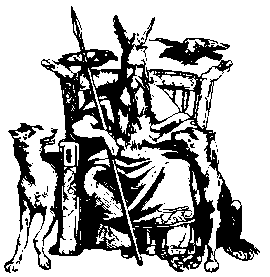
Norse Religion, or Heathenry, is the modern-day practice of the ancient tribal belief systems of the Northern European peoples; the Teutons (continental Germanic tribes) and the Norse (Scandinavian and Gothic tribes). Although their deities were pretty much the same, they were pronounced differently among the various tribes. Thus you have Odin among the Norse, and Wotan or Wodan among the Teutons; Thor or Thonar among the Norse, and Donar or Donner among the Teutons. There are several different modern practices of Heathenry. The main religious tradition is known as Asatru, meaning "loyalty or troth to the Gods." The main focus of Asatru has been to recapture and reconstruct the ancient tribal religion of the Norse through the recordings of the lore and the sagas. Unfortunately, most sagas are not intact, and have been highly influenced by Christian philosophy, so the task of reconstruction is rather difficult. Asatru is one of the noblest religions, but it's current infrastructure lends itself to some squabbling and infighting among the various sects concerning interpretations of the sagas, due in part to the unavailability of complete information. There is also great disparity among the groups, ranging from those who believe that only those of the Nordic/Germanic blood line can practice Asatru, to more progressive branches which welcome all people. Asatru, however, is not about political agendas, but about in pledging one's faith to the Gods and living one's life in the most honorable manner. Asatru is also very much concerned with maintaining family and community; two major concerns of the Germanic/Norse peoples. A branch of Asatru refers to itself as "Folkish Asatru". This particular denomination of Asatru claims to be the one "true" Asatru, descended from the ancient Northern European religion. Members of Folkish Asatru claim that bloodline is the strongest determinant of whether or not a person may practice the Norse Heathen faith. Although they claim not to be racist (actually, not to be supremacist), their fundamental practices are based upon race. Folkish Asatru tend to be intolerant of other heathen practices and of people of non-Nordic/Germanic descent practicing Asatru. Another branch of heathenry is Norse Wicca, which is gaining popularity among the Wiccan community. Norse Wicca is a synthetic religion that is based out of Gardnerian Wicca, using the Norse pantheon of deities. It's philosophy is that there is a God and Goddess (Lord and Lady), and all other Gods and Goddesses are reflections of the one great Masculine and Feminine principle. Because it is a synthetic religion, many practitioners of Norse Wicca frequently "borrow" elements from other religious practices and pantheons; thus you now have Runic studies mixed in with Native American traditions, or Norse deities wedded to Egyptian archetypes among members of the more "electic" forms of this worship. Needless to say, such practices are regularly looked askance by the more traditional heathen community, and Norse Wicca generally does not enjoy a favorable reputation among fundamentalist practitioners of Asatru. I personally feel that if a person derives spiritual meaning from a particular religious "blend", then more power to them; just refer to it as "Wicca", and not as "Asatru", which it is not. Yet another branch of heathenry calls itself "Odinism." It is very close to Asatru, but with more emphasis on magical working rather than religious practices. I find that more solitary practitioners are drawn to this form rather than to Asatru, even though the two are so close in their practices as to be nigh-well undistinguishable. Again, I find the main difference to be upon the emphasis of magickal working rather than ceremonial religious ritual. Unfortunately, many people who profess to be Odinists use the term for their own political agendas of racism and White Supremacy. This is not what this form of worship is about; Racism is a political agenda, not a religious one. Don't let anyone try to tell you differently. Another form of heathenry is Theodism, or that of the Old English (Anglo-Saxon) tradition. Theodism follows the practice of following a "Sacred King," although the same Gods and much of the same tradition is practiced as Asatru. Finally, there are practitioners of Norse
Heathenism who are simply interested in the ancient folk beliefs and
practices of the Northern Europeans. These tend to be strictly
solitary practitioners, most of them hailing back to the Old World;
with family legends and religious practices that go back for
generations.
Contact for more information regarding this page. This page created on September 9, 1996. Last updated: March 23, 2010. |
